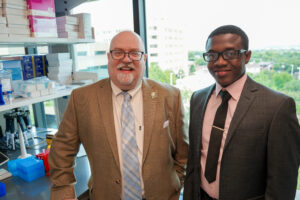HSC pharmacology team employs AI in a novel approach to face off against opioid addiction
- July 30, 2024
- By: Sally Crocker
- Research
 Every medicine we take is a simple molecule or chemical that has a specific target within the body.
Every medicine we take is a simple molecule or chemical that has a specific target within the body.
Opioids are meant to quiet pain, but the side effects release dopamine in the brain that can lead to a pleasurable feeling of “I like this, and I’d like to experience it again,” said David Siderovski, PhD, a researcher at The University of North Texas Health Science Center at Fort Worth who has been working to address substance use disorder for more than 20 years.
Now, in a novel application of artificial intelligence, Dr. Siderovski and HSC doctoral student Percy Agogo-Mawuli have employed high-performance computers surveying billions of virtual molecules to identify two chemicals with the potential of relieving pain without the addictive opioid side effects.
What would otherwise have taken years of physical lab testing on billions of individual chemicals has been accomplished by this “virtual screening” in record time. It’s like working through a maze with a multitude of options, but instead of following one pathway at a time, you can try them all at once.
Siderovski, a professor of pharmacology and neuroscience at HSC’s School of Biomedical Sciences, joined with 600 other researchers from around the world – each testing the AI technology of a digital health company called Atomwise – to discover new drugs for different diseases. The results of their work, in the report “AI is a Viable Alternative to High Throughput Screening: a 318-Target Study,” were recently published in Nature Scientific Reports.
A protein called RGS12, found in the brain’s “reward pathway,” is responsible for sustaining the dopamine rush that leads to long-term addictive effects of opioid painkillers, other habit-forming medicines and street drugs. Siderovski’s lab previously found that responses to addictive stimulants like cocaine and methamphetamine are sharply reduced in the absence of RGS12, but for years no inhibitor for this protein had been identified through traditional chemical library screenings.
Siderovski and Agogo-Mawuli applied the AI technology to identify 96 potential inhibitors of RGS12, finally hitting on two chemicals that worked in physical lab testing. Their discovery has proven that a therapeutic target for preventing opioid use disorder, previously considered “undruggable,” can indeed be inhibited by AI-identified compounds.
“I have been pursuing this very target since 1998, but originally using traditional screening approaches,” Siderovski said. “This is a true milestone moment for me.”
Siderovski directly approached the U.S. opioid crisis while serving as chair of physiology and pharmacology at West Virginia University, in a state leading the nation in substance misuse and overdose deaths. During the years 2011 to 2021, West Virginia overdose death rates rose from 31.5 to 77.2 per 100,000 people. Siderovski’s published work in this important area continued when he joined HSC in 2020.
With the recent, dramatic rise in fentanyl overdose deaths and the long-standing, unresolved U.S. opioid crisis, Agogo-Mawuli emphasizes the “critical need to explore new approaches, like employing artificial intelligence models on high-performance computing platforms, to identify new treatments for substance use disorders.”
“As a PhD student, I believe that this problem can be turned into an opportunity to make a significant impact on drug addiction treatments,” he said.
Next steps
“We are in the early days now of moving this discovery from the lab to clinical use against substance misuse and addiction,” Agogo-Mawuli said.
Drug discovery follows a long path. The start is to find a model compound that works for a particular disease.
“We are now at a point where we know that these two chemical candidates work in the test tube. The next phase would be pre-clinical testing that could advance to human trials among those experiencing opioid use disorder,” Siderovski said.
“It’s a long time before a drug makes it to market, but AI’s computational approach has opened the door to finally removing the profoundly addictive qualities of opioids and also exploring many other therapy targets,” he added.
“These findings, including our target and over 300 other disease targets championed by other researchers’ labs around the world,” Siderovski said, “reveal a promising growth of emergent artificial intelligence into a new field of computational pharmacology.”
The HSC research team on this project also included Ian Dadeboe, a recent graduate of the M.S. in Medical Science program, who is now pursuing a medical degree.






Social media